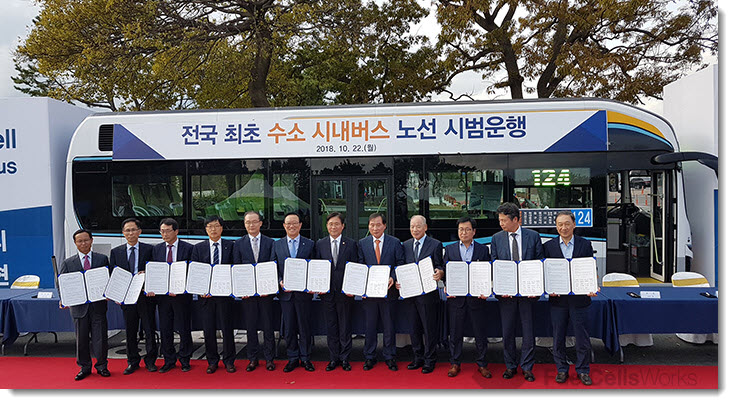South Korean Fuel Cell Industry Developments
Jack Chaben
By Jack Chaben, FCHEA intern
In the past few years, South Korea has emerged as a strong proponent of fuel cells and hydrogen energy. Between supportive government ventures and innovation from local industry, the country is positioned to become a global leader in fuel cell technology. As an energy poor country, importing roughly 98% of all fossil fuels, South Korea can stimulate economic opportunity and enhance its energy security by supplying a larger portion of its own energy. Whether powering vehicles or providing electricity, fuel cells are a key component of the country’s powerful growth engine.
According to the South Korean government, this transition to a hydrogen economy will create roughly 420,000 new jobs and bring in $38.2 billion by 2040. In the transportation sector, fuel cells and hydrogen energy has become a central aspect of South Korea’s energy transformation. As of 2018, 2,000 fuel cell vehicles (FCVs) and 14 hydrogen fueling stations were in operation throughout the country. By 2040, South Korea forecasts up to 6.2 million vehicles paired with 1,200 hydrogen stations, making the country a top producer of FCVs and the supporting hydrogen infrastructure.
The 2018 Winter Olympic Games in South Korea gave FCHEA member Hyundai Motor Company a high-profile stage to demonstrate the capabilities of its FCVs and buses. The company gave test drives of its NEXO fuel cell SUV to visitors to demonstrate its design and driving experience. During the Olympics, Hyundai hosted a delegation of fuel cell stakeholders in South Korea. Morry Markowitz, FCHEA President, attended the event and rode in the NEXO, as Hyundai revealed its plans for the vehicle’s future global presence.
Hyundai’s Hydrogen Pavilion at the 2018 Winter Olympic Games showcased the company’s hydrogen technology and NEXO FCV. Source: Hyundai Motors
Hyundai’s NEXO has become the company’s top-selling FCV after its launch in the country in March 2018. In October, Hyundai officially launched its first hydrogen fuel cell bus in South Korea, in the city of Ulsan, leading the country’s charge to 2,000 fuel cell buses by 2022 and replacing all police buses with hydrogen-powered buses in 2021. In December, the company announced a $6.7 billion investment through 2030 to increase production of fuel cell units from 3,000 to 700,000 annually. The announcement came at the groundbreaking ceremony for Hyundai’s second fuel cell system factory in South Korea, solidifying the company’s commitment to a hydrogen-powered future in the country.
A recent partnership between SK E&C and fuel cell manufacturer Bloom Energy has reinforced the economic and energy potential for stationary fuel cell systemsin South Korea, which the country has been investing in and deploying on a large-scale for quite some time now. Using Bloom Energy Servers, SK E&C will supply 6 MW of fuel cell stacks for Korea Midland Power Co. (KOMIPO), one of South Korea’s six regional power generation companies. The project will be installed in the densely populated center of the Seoul metropolitan area, and will power more than 12,000 homes.
Bloom Energy Servers will also power two projects for KT Corporation, South Korea’s largest telecommunications company. The two 900 kW projects will provide electricity directly to the national grid, and power more than 1,800 homes.
Hyundai’s first commercial hydrogen-powered bus began commercial service in Ulsan in October of 2018. Source: Hyundai Motors
In July, FCHEA member FuelCell Energy announced a 20 year service agreement for their recently completed 20 MW fuel cell project with Korea Southern Power Co. Ltd. (KOSPO). The eight SureSource power plants, which were constructed and commissioned in ten months, will cleanly produce electricity and thermal energy to support the district heating system.
Construction of the world’s first large-scale hydrogen fuel cell power plant is also underway in South Korea. In August, FCHEA member Doosan Fuel Cell announced that the innovative, 50 MW power plant will complete construction in 2020, and will be Doosan’s largest fuel cell deployment since entering the market. The project, which will be developed by South Korean special purpose company Daesan Green Energy, will contribute 400,000 MWh of electricity each year, enough to power 160,000 homes.
Doosan previously built South Korea’s largest fuel cell production facility, completing construction in May 2017. The Iksan Factory has the capacity to produce 144 units of 440-kilowatt fuel cells each year, which would add up to 63 MW of production capacity. Doosan also began producing electrodes for their fuel cells in-house, and adopted an automated production system for fuel cell stacks.
As South Korea works to diversify its energy portfolio and reduce its external dependence on fossil fuels, hydrogen is becoming a critical resource. As a fuel source for stationary facilities and transportation needs, hydrogen and fuel cells are a versatile source of energy that will allow South Korea to promote a clean and sustainable future.


